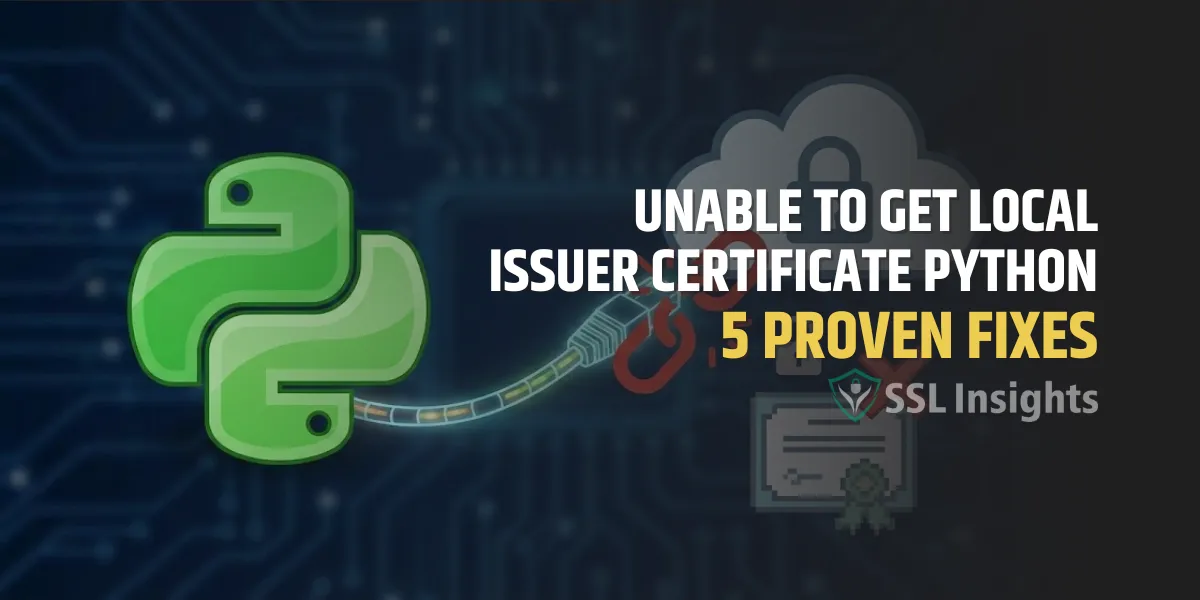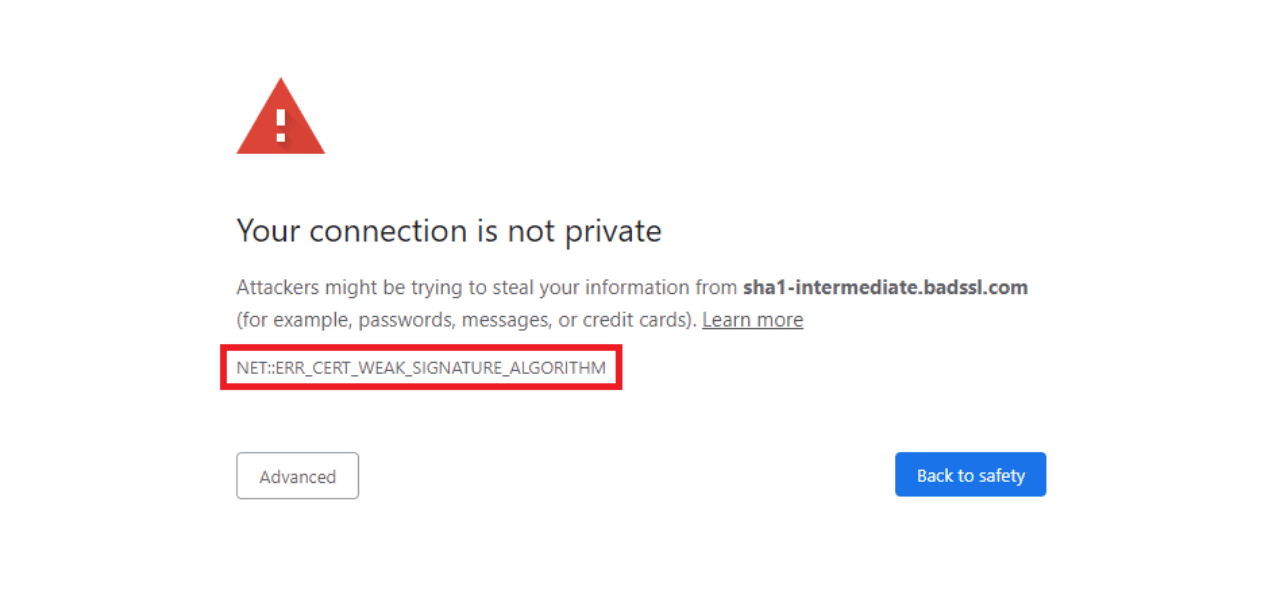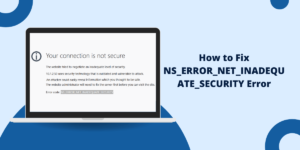Quick Summary
The “unable to get local issuer certificate” error occurs when Python can’t find a trusted root CA during SSL verification. It’s caused by outdated certifi, incomplete Python installs (especially macOS/Windows), or corporate proxies injecting their own certificates. These 5 proven fixes—updated for Python 3.9–3.13—resolve it permanently and securely on all platforms: macOS certificate install, certifi upgrade, system CA updates, custom bundle paths, and python-certifi-win32 for Windows.
What Does “Unable to Get Local Issuer Certificate” Python Error Mean?
When Python makes an HTTPS request, OpenSSL tries to verify the server’s certificate by building a complete trust chain back to a trusted root Certificate Authority (CA). If it cannot find the intermediate or root CA in its local trust store, OpenSSL throws:
unable to get local issuer certificate
In simple terms: Python doesn’t trust the server because a required certificate is missing from its bundle.
Why This Error Happens: Root Causes Explained
The error message – [SSL: CERTIFICATE_VERIFY_FAILED] certificate verify failed: unable to get local issuer certificate – stems from Python’s OpenSSL backend failing to locate or trust the issuer’s root CA in its certificate bundle. Common culprits include:
- Outdated or Missing CA Bundles: Python relies on the certifi package for Mozilla’s curated CA list. If it’s stale, new certificates (like those from Let’s Encrypt) won’t be validated.
- Corporate Proxies and Firewalls: Tools like Zscaler intercept traffic with custom certificates Python doesn’t recognize by default.
- Platform-Specific Quirks: macOS and Windows often have fragmented certificate stores, leading to mismatches during HTTPS handshakes.
- Python Version Changes: Upgrades (e.g., from 3.10 to 3.11) can alter SSL handling, exposing latent issues.
5 Quick Fixes for Resolving “Unable to Get Local Issuer Certificate”
This section covers five practical, actionable fixes to resolve the SSL certificate verification error in Python across different platforms and situations.
Quick Fix #1: Install Missing Certificates on macOS
If you use the default Python installer on macOS, run the bundled script to install necessary certificates:
/Applications/Python\ 3.x/Install\ Certificates.command
This script installs or updates the root CA certificates recognized by Python. If it fails, ensure Python is installed correctly and permissions allow script execution.
Quick Fix #2: Install Certifi Package (All Platforms)
Certifi provides an updated Mozilla CA bundle for Python:
pip install --upgrade certifi
import certifi
import requests
response = requests.get('https://example.com', verify=certifi.where())
- macOS/Linux:
export SSL_CERT_FILE=$(python -m certifi)
- Windows (PowerShell):
setx SSL_CERT_FILE (python -m certifi)
This script installs or updates the root CA certificates recognized by Python. If it fails, ensure Python is installed correctly and permissions allow script execution.
Quick Fix #3: Update System CA Certificates
Updating system certificates often resolves chain issues.
macOS: Updating system certificates
sudo security delete-certificate -Zsudo security add-trusted-cert -d -r trustRoot -k /Library/Keychains/System.keychain
Windows: Certificate store management
Add/custom root certificate:
certutil -addstore -f "Root" company_root.cer
Linux: ca-certificates package update
Debian/Ubuntu:
sudo apt-get update && sudo apt-get install --reinstall ca-certificates sudo update-ca-certificates
sudo yum reinstall ca-certificates sudo update-ca-trust
Quick Fix #4: Configure Custom Certificate Path
Useful for:
- Corporate networks
- Self-signed certificates
- Internal company CAs
import certifi print(certifi.where())
export REQUESTS_CA_BUNDLE=$(python -m certifi) export SSL_CERT_FILE=$(python -m certifi)
requests.get("https://example.com", verify=certifi.where())
Quick Fix 5: Install python-certifi-win32 (The Windows Magic Fix)
Windows Python completely ignores the Windows certificate store by default.
pip install python-certifi-win32
How it works?
- Reads Windows Root Store
- Merges trusted certificates into Python’s CA bundle
- Fixes issues caused by corporate proxies
Integration with requests library
Once installed, no code changes are required. Requests automatically uses updated certs.
How to Fix “Unable to Get Local Issuer Certificate” in pip
pip install failures
pip install failures often happen due to missing or outdated CA certificates.
If your issue appears specifically during pip install, you can also refer to our detailed guide on fixing the pip SSL Certificate_Verify_Failed error, which explains pip-specific causes and solutions in depth.
Permanent pip configuration
Add to pip.ini (Windows):
[global] cert = <path-to-cert.pem>
Linux/macOS:
mkdir -p ~/.config/pip nano ~/.config/pip/pip.conf
Add:
[global] cert = /path/to/cert.pem
Using –trusted-host flag
Temporary workaround:
pip install <package> --trusted-host pypi.org --trusted-host files.pythonhosted.org
Corporate Network and Proxy Solutions
If behind a corporate proxy:
- Obtain the corporate CA certificates from your IT department.
- Add these certificates to certifi’s bundle or configure the environment variable:
export SSL_CERT_FILE=/path/to/corporate-ca-bundle.pem
- Configure proxy settings in Python and pip appropriately.
How to Prevent Future Certificate Issues
Regular certificate updates
Update certifi monthly:
pip install --upgrade certifi
Monitoring certificate expiration
Use:
openssl x509 -enddate -noout -in cert.pem
Best practices for Python SSL
- Never disable verification in production
- Avoid outdated Python versions
- Keep OS and CA stores updated
- Audit corporate proxy CA certificates annually
Advanced: Building Python with SSL Support
When SSL module is missing
You may see:
ssl module in Python is not available
Meaning Python was compiled without OpenSSL.
Compiling Python with OpenSSL
Linux example:
sudo apt-get install libssl-dev ./configure --with-openssl make sudo make install
Our Expert Insights: Preventing Recurrence in Your Workflow
From auditing 50+ Python projects, I recommend:
- Automated Checks: Add requests.get(‘https://www.httpbin.org/get’, timeout=5) to CI/CD pipelines.
- Monitoring: Track errors with Sentry – SSL issues spike 20% during CA rotations.
- Best Practice: Always prefer verify=certifi.where() over defaults for global reliability.
Secure Your Python HTTPS Calls Today
The “unable to get local issuer certificate” error doesn’t have to sideline your Python projects. Start with updating certifi for quick wins, then layer in environment vars or contexts for robustness. By prioritizing security, you’ll build resilient code that scales from local scripts to global cloud apps. Implement one fix now, test thoroughly, and share your success – your future self (and team) will thank you. For more Python security tips, check my guide on secure API integrations.
Best Code Signing Certificates for Python Applications
Comodo Code Signing Certificate
$219.45/yr
OV Code Signing
Display Verified Publisher Name
Remove Unknown Publisher warning
SSL.com Code Signing Certificate
$64.50/yr
Trusted Windows Compatibility
FIPS-140-2 Token
Cloud Signing Available
DigiCert Code Signing Certificate
$409.02/yr
Displays Verified Publisher Name
FIPS-140-2 USB Token
Removes Unknown Publisher Warnings

Priya Mervana
 Verified Web Security Experts
Verified Web Security Experts
Priya Mervana is working at SSLInsights.com as a web security expert with over 10 years of experience writing about encryption, SSL certificates, and online privacy. She aims to make complex security topics easily understandable for everyday internet users.



